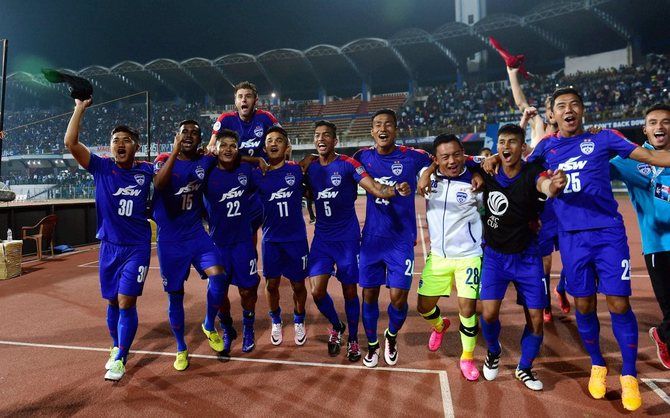
The Indian Super League will be expanded to 10 teams this season with the organisers on Monday announcing two more franchises after a bidding process, with Bengaluru FC set to ply in the three-year-old ISL by leaving I-League.
The ISL announced that Tata Steel Limited and JSW Group won the bids for the two new teams. The teams will be based in Jamshedpur and Bengaluru.
"Football Sports Development Limited -- the joint venture between IMG-Reliance & Star India today announced the addition of two of India's largest conglomerates Tata Steel Ltd – a $ 18.12 billion company and subsidiary of Tata Group ($103.51 billion 2015-16) and Jindal South West (JSW) Group --$ 9 billion corporate into the fold of Indian Super League," the ISL said in a statement.
"The inclusion of two new clubs came through the 'Invitation To Bid' tender process floated by FSDL last month. An independent panel along with consulting firm EY evaluated the bids to present its report today to the panel, in the presence of All India Football Federation General Secretary Mr Kushal Das," it said.
"The ISL in its fourth edition will witness an expanded five-month module with number of participating clubs increasing to ten from its original eight founding member city clubs."
JSW Group, which owns Bengaluru FC through its subsidiary JSW Sports, won the right to participate in ISL from Bengaluru.
Tata Steel Ltd, which has won the bid to participate from Jamshedpur, is the pioneering Indian corporate to have provided national football with perennial pool of young footballers since 1987 through its Jamshedpur based facility -- Tata Football Academy.
The announcement of the increase in the number of teams in the ISL from eight to 10 came amid uncertainty and discontent among I-League clubs regarding the domestic football structure chalked out by the All India Football Federation.
Bengaluru's decision to join the ISL meant that the AIFF could have agreed to granting an AFC Cup play-off slot to ISL champions as the club has continental ambitions. They have won two titles in the three years they competed in the I-League and were the runners-up in the AFC Cup last season.
The other top clubs - Mohun Bagan and East Bengal – also wanted to join the ISL, which has been a hugely successful product in the three years of its existence, but did not do so after their request of doing away with the entry fee of Rs 15 crore was shot down.
According to the roadmap of the AIFF, which though is yet to be finalised, the Indian domestic football structure will have three tiers with the ISL being the top league and the current I-League and second division I-League being christened as League 1 and League 2.
After protest from clubs like Mohun Bagan, East Bengal and Aizawl FC which felt that I-League will lose it relevance by being overshadowed by the cash-rich ISL, the AIFF has maintained that I-League will be the top league in the country, a proposition few are willing to buy.
The ISL said that after successfully establishing Indian football in the global arena and achieving the rare milestone of being the third most attended football league globally, the league is positioned to provide exponential growth to the sport in the country.
Sunil Bhaskaran, vice president corporate services, Tata Steel and chairman TFA, said, "This is a momentous occasion for Tata Steel, which has always been a pioneer in the development of sports in the country, especially football.
"Our entry into coveted Indian Super League reinforces our commitment to provide a fillip to the development of football in the country. We are extremely excited to have won the bid for our hometown Jamshedpur and will provide the best of facilities for football to prosper in the eastern part of our country."
Parth Jindal, CEO JSW Bangaluru FC, attributed JSW Group's decision to bid for an ISL team to the "interest of long-term future of Indian football".
"We are glad that our bid to be part of the ISL has been accepted. A lot of time and thought has gone into our decision of wanting to be part of the Indian Super League. The biggest factor has been the interest of the long-term future of Indian football. A longer league is the right road ahead," he said.












 © 2025
© 2025